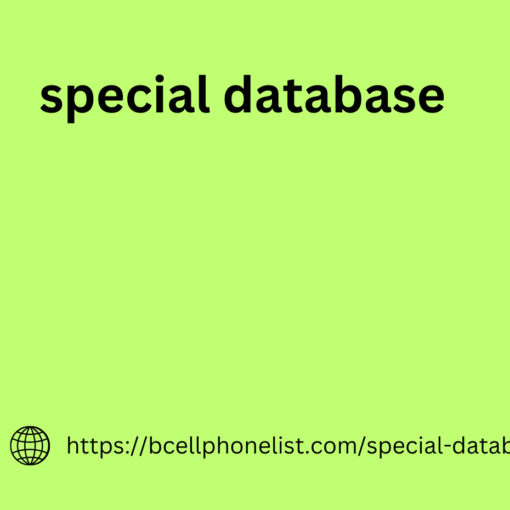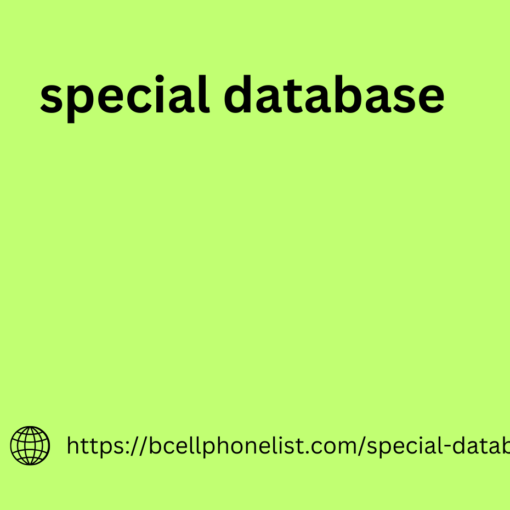- : Expertise is a fundamental part of EAT. Google looks for content created by individuals or brands with a demonstrable level of expertise in their respective fields. This goes beyond a superficial understanding: Google evaluates the depth and breadth of knowledge, looking for content that truly showcases a high level of expertise.
Demonstrate expertise:
- Submit relevant credentials, certifications advertising database and qualifications.
- Write comprehensive, in-depth content that addresses topics with authority.
- Highlight industry experience and thought leadership.
- Authority: Authority is about being recognized as a credible source within a particular industry or niche. Google evaluates the reputation of the author or brand to determine their authority. Backlinks from other authoritative websites and positive mentions go a long way in establishing authority.
Show authority:
- Build a robust backlink profile with links from reputable websites.
- Engage in industry collaborations and partnerships.
- Encourage positive reviews and testimonials.
- Trustworthiness: Building trust is a key aspect of building trust with users. Google evaluates the trustworthiness of a website by looking at things like security measures, transparency, and accuracy of information transmitted. A secure website (HTTPS), clear privacy policies, and transparent business practices help build trust.
Demonstrate reliability:
- Implement security measures such as SSL certificates.
- Provide clear and transparent information about the company.
- Regularly update and fact-check to ensure accuracy.
Why EAT is important: the impact of SEO
EAT (Expertise, Authoritativeness, and corporate digital marketing training from webpromoexperts Trustworthiness) plays a pivotal kuidas redditis reklaamida role in the field of search engine optimization (SEO), significantly influencing a website’s visibility and credibility. Understanding the importance of EAT goes beyond its acronym; it’s about recognizing its profound impact on SEO and online content.
-
Improved search rankings:
-
-
- Expertise: Content that presents in-depth and broad knowledge is favored by search engines, resulting in higher rankings.
- Authority: Websites that are recognized as credible sources in their niche tend to rank higher, especially with backlinks from reputable sites.
- Trustworthiness: Websites that demonstrate transparency, security, and accurate information are perceived as more trustworthy, which improves their search rankings.
-
-
User-centric approach:
-
-
- Prioritizing EAT aligns with delivering b2c fax valuable, relevant content that meets user intent, thereby improving the user experience.
- Google prioritizes content that meets user expectations, leading to higher rankings for websites that focus on EAT principles.
-
-
Content quality and trust:
-
-
- EAT principles focus on creating high-quality, trustworthy content that contributes to user trust and engagement.
- Websites that adhere to EAT are less likely to spread misinformation, promoting a trustworthy online environment.
-
-
YMYL (Your Money or Your Life) Niches:
-
-
- Niches related to health, finance and security are subject to rigorous scrutiny by the EAT due to their potential impact on user well-being.
- Adherence to EAT becomes imperative in these niches, ensuring accurate and authoritative content to protect users’ health and financial decisions.
-
-
Future-Proof SEO Strategies:
-
- As Google’s algorithms evolve, the importance of EAT continues to grow, indicating its long-term relevance in SEO strategies.
- Adopting EAT not only meets current search engine requirements, but also prepares businesses for future algorithmic changes.
Demonstration of EAT in content creation
- Author Profiles: Establishing clear author profiles is crucial, especially for YMYL (Your Money or Your Life) content. Include details about the author’s qualifications, expertise, and relevant experience. This not only ensures transparency, but also helps build trust.
- Creating Quality Content: Prioritize creating high-quality, authoritative content that matches users’ search intent. Content should be well-researched, comprehensive, and presented in a format that is easy for users to consume.
- Credible citations and references: When creating content, support statements and claims with credible citations and references. Links to reputable sources can improve the credibility of the content and provide users with additional resources.
- User Reviews and Testimonials: Integrate user reviews and testimonials to demonstrate positive experiences alongside your products or services. Authentic feedback from satisfied customers contributes to the overall trustworthiness of your brand.






